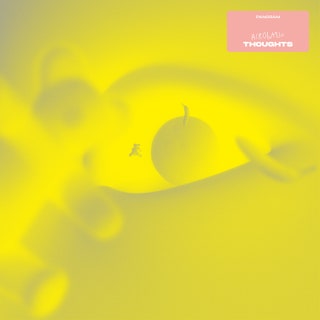On his vivid and eccentric new album, the Roman-born electronic producer smooths down some of his edges and sinks deeper into an air of wide-eyed rapture.
Working backward through Raffaele Martirani’s catalog as Panoram, you might get the impression that he’s an incorrigible trickster. The Roman-born, Brooklyn-based musician’s most recent release was a 7" of hazy electro-funk and wistful ambient featuring an actual cannabis leaf pressed inside the clear vinyl disc. The promotional text hinted that the label responsible, a new outfit called Arpabong, might have been dipping into its own stash: “Life forms and attached information merge in a sonic mash-up re-linking to the inexorable pluralism of florae, order, listening statics and scientific protocols evolve into a bio-acoustic morphology.” It came out on April 20, of course.
The record before that, however, was a more serious affair. Pianosequenza Vol.1 gathered Martirani’s experiments on the Yamaha DC7X, a MIDI-controlled acoustic grand piano capable of both breathtaking complexity and profound delicacy. Aphex Twin is believed to have utilized a similar instrument on “Avril 14th”; Martirani used it to achieve a black MIDI-like blur of runs that no human could play, as well as elegantly detuned tones suggesting light lensing around black holes.
The truth of Martirani’s musical character probably lies somewhere between those two poles: Conlon Nancarrow in the streets, Jeff Spicoli in the sheets. Since 2014 he has developed an idiosyncratic signature by cobbling together various styles—IDM, library music, classical minimalism—into a loose, low-key vibe where kitsch mingles with the sublime and whimsy tickles awe’s funny bone. It’s an unpredictable sound, lysergic and squirrelly. In Panoram’s world, just a few neurons separate a chuckle from a swoon. But Acrobatic Thoughts marks a subtle shift in emphasis, smoothing down some of Martirani’s gonzo edges and sinking deeper than ever into an air of wide-eyed rapture.
The album takes its tonal cues from classic chill-out sounds. It’s awash in lush synthesizers slathered on in creamy harmonies, while telltale vocal textures—whether choral synthesizer pads or monosyllabic samples played up and down the scale—lend human warmth. A century’s worth of ambient tropes swirl together in “Pseudolove,” where Satie-like piano chords commingle with pitch-bent strings reminiscent of the steel guitar of the KLF’s Chill Out. In “Wandering Frames,” a stumbling, slowed-down sample of new-wave drums anchors synths that billow like hot-air balloons, and an indistinct loop of a child speaking recalls Boards of Canada’s cheerful emotional blackmail. The space-age lounge jazz of “Z Miles” evokes ’90s electronica’s fascination with the ’60s; the song’s reverbed drums, dubbed-out vibraphone, and abstract splashes of sax wouldn’t sound out of place on Mo Wax’s canonical Headz compilations.
But Acrobatic Thoughts never settles for mere trip-hop pastiche. In “Storme,” burbling synth patterns mimic the moire-like layers of Steve Reich, but there’s also a touch of My Bloody Valentine in the way the chords seem to smear together; spilling over the rhythmic grid, the song’s erratic pulse feels neither played nor programmed, but possibly generative, as though triggered by natural processes—dripping icicles recorded in time lapse, perhaps, or the chemical communications of a mycelium network. “Monocielo” is even more intense, with violin-like arpeggios spiraling frantically atop the sounds of rolling waves. In “Fiction of a Sea,” Martirani puts a mellower spin on the aquatic scene, using jazzy chords to depict the translucent curl of a wave and bursts of digital distortion to simulate the foam of the break. A layer of squeaks and squawks even colors in the seagulls at the edge of the frame. Playing off the faintly campy air of vintage porn soundtracks and nature documentaries, Martirani paints a vivid picture in sound.
He’s at his most boisterous on the giddy “Beautiful Engines,” a Boards of Canada-inspired reverie that explodes into tumultuous prog-rock drum fills. It’s a tricky balancing act, juggling such opposing modes, but Martirani pulls it off; the drums never quite tip over into full-on ridiculousness. On the contrary, this willingness to go a little nuts is what makes Acrobatic Thoughts so refreshing: In defiance of mood-music piety, Martirani taps into the eccentricity that fueled the best Balearic music of the ’80s and ’90s. And despite the big, gushing chords, sloppy as a golden retriever’s kiss, there’s frequently a hint of something feral that lurks beneath. Album highlight “Seabrain” is a case in point: The song’s airy, major-key pads and crisply pinging percussion, dead ringers for Aphex Twin’s Selected Ambient Works 85-92, are suffused in all the optimism of golden-age rave music. Listen deeper, though, and dissonant metallic shards cut crosswise against that beatific mood. The mix of emotions is pure Panoram: The sunset is so rosy, you almost don’t notice the blade glinting in the middle distance.
















0 comments:
Post a Comment